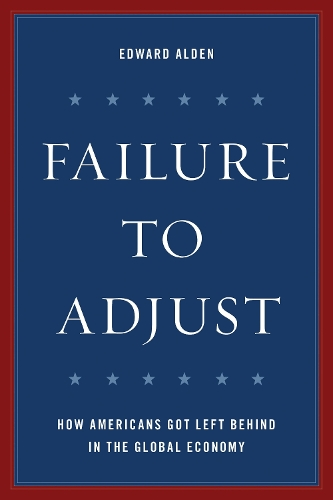
Failure to Adjust: How Americans Got Left Behind in the Global Economy
(Hardback)
Available Formats
Publishing Details
Failure to Adjust: How Americans Got Left Behind in the Global Economy
By (Author) Edward Alden
Bloomsbury Publishing PLC
Rowman & Littlefield Publishers
20th October 2016
United States
Classifications
Tertiary Education
Non Fiction
Globalization
330.951
Winner of Bloomberg Best Books of 2016.
Physical Properties
Hardback
258
Width 163mm, Height 235mm, Spine 26mm
522g
Description
Americans know that something has gone wrong in this countrys effort to prosper in the face of growing global economic competition. The vast benefits promised by the supporters of globalization, and by their own government, have never materialized for most Americans. This book is the story of what went wrong, and how to correct the course. It is a compelling history of the last four decades of US economic and trade policies that have left Americans unable to adapt to or compete in the current global marketplace. Failure to Adjust argues that, despite the deep partisan divisions over how best to respond to Americas competitive challenges, there is achievable common ground on such issues as fostering innovation, overhauling tax rules to encourage investment in the United States, boosting graduation rates, investing in infrastructure, and streamlining regulations. The federal government needs to become more like U.S. state governments in embracing economic competitiveness as a central function of government. The book presents an especially timely analysis of the trade policies of the Obama administration, and discusses how America can reassert itself as the leader in setting rules for international economic competition that would spread the benefits of global trade and investment more broadly.
Reviews
In this criticaland thoroughanalysis of US government policies regarding the countrys involvement in the global economy during the last half century, the author (Council on Foreign Relations) concentrates on the changing competitive environment the US faces. In the process of assessing the impact of those changes, he discusses a wide range of policies and how they affect US economic progress and international relations. Those policies include not only tariffs and trade agreements but also domestic tax policies, government support for enhanced investment, improvements in the education system, immigration issues, and monetary policies as they influence the international role of US currency. Part of the analysis deals with state and local governments attempts to take advantage of international economic opportunities in the face of insufficient federal commitments. In the process, the author also provides an insightful history of worldwide economic transformation over the last 50-plus years. This analysis is very well written and documented and is strongly recommended to anyone interested in international trade and global economic development, especially as national policy pertains to them.
Summing Up: Recommended. Upper-division undergraduates through faculty.
Rising opposition to globalization has thrown an already polarized political environment in America into near mayhem, with our key economic partnerships hanging in the balance. Ted Alden provides a cogent and constructive analysis of the origins of opposition to economic openness that charts a viable path forward. It is essential reading for all who care about America's role in the global economy. -- Gordon Hanson, Pacific Economic Cooperation Chair in International Economic Relations at UCSD and Director, Center on Global Transformation
Ted Alden hits the nail on the head with this cogent analysis of the trade issue, its impact on American workers, our failure to meaningfully help those adversely affected and what we should now be doing to save globalization by adopting more thoughtful and far-reaching policies. -- Steven Rattner, Chairman, Willett Advisors LLC
Ted Alden's new book, Failure to Adjust, captures vividly the inherent tension in Americas role in the post-war global economy: that between the principal architect and guardian of an open system, on the one hand, and a participant and competitor within that system, on the other. That tension cannot be removed. But in Aldens thoughtful analysis, as the global economy grows, the balance between player and referee that needed to shift in America in favor of the former, has been late in coming. It is a really interesting and detailed assessment, that avoids overly simple diagnoses and prescriptions. -- Michael Spence, Nobel Laureate and William R. Berkley Professor in Economics and Business, New York University
[Alden] demonstrates how four decades of market-friendly economic and trade policies have been insufficiently inclusive, setting the stage for the populist backlash were now experiencing. -- Sebastian Mallaby, The Wall Street Journal
Author Bio
Edward Alden is the Bernard L. Schwartz senior fellow at the Council on Foreign Relations, and the author of The Closing of the American Border: Terrorism, Immigration and Security Since 9/11 (Harper, 2008), which was a finalist for the J. Anthony Lukas Book Prize.
